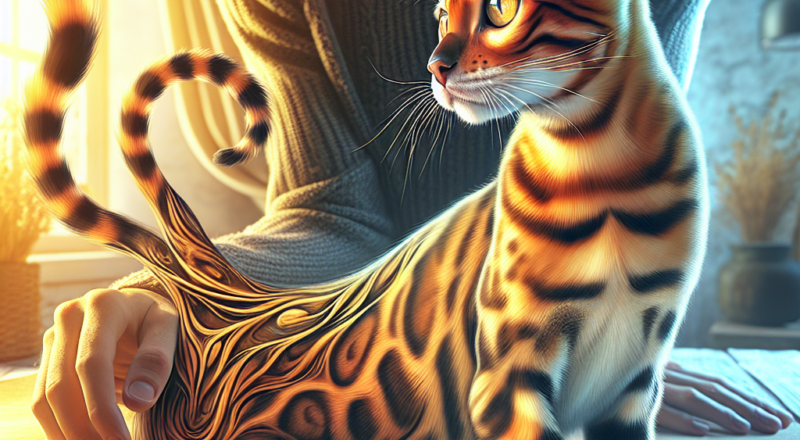Bengal cats have captivated the hearts of many with their wild appearance and amiable nature. Known for their distinctive leopard-like spots and a strikingly affectionate personality, Bengal cats are a popular choice among feline enthusiasts.
Table of Specifications
Here’s a quick overview of the essential attributes of the Bengal cat:
- Origin: United States, 1960s
- Weight Range: 8-15 pounds
- Lifespan: 12-16 years
- Coat: Short and dense, spotted or marbled
- Energy Level: High
- Affection Level: Very High
The Charismatic Traits of Bengal Cats
Bengal cats are known for their playful and energetic demeanor. They thrive in active households and are keen on exploring their surroundings. Their intelligence is evident in their ability to learn tricks and even leash train.
Health and Well-being
While Bengal cats are generally robust, they can be prone to certain genetic conditions such as hypertrophic cardiomyopathy. Regular check-ups with a veterinarian are essential. Feeding a balanced diet and providing enough physical and mental stimulation is crucial for their well-being.
The Joy of Owning a Bengal
Bengal cats offer immense joy with their playful and social nature. They interact well with families and enjoy playing interactive games that challenge their intelligence and agility. It’s essential to note they may demand more attention than an average cat, making them a less ideal choice for someone who won’t be home frequently.
Social Dynamics
They get along well with children and can coexist with other pets, given proper introductions. Bengals can become bored if left alone too often; hence, offering companionship or interactive toys is advisable.
Understanding Bengal Nutrition and Care
Keeping a Bengal cat requires diligence in ensuring their nutritional needs are met. High-quality cat food balancing proteins, fats, and carbohydrates will support their active lifestyle.
Regular vaccination and routine veterinary visits are vital. Furthermore, engaging them in diverse activities and play enhances their quality of life and maintains their health.
Adoption and Its Benefits
Adopting a Bengal cat can be incredibly rewarding. Look into local shelters and Bengal-specific rescues to find your companion. Adoption not only saves a life but also offers a unique partnership with a delightful breed.
Economic Aspects of Bengal Ownership
Being aware of ongoing costs such as food, veterinary bills, and grooming supplies will prepare you for responsible Bengal ownership.
Know Your Legal Obligations
Understanding local animal legislation and the rights of pet ownership is critical. Ensuring your Bengal cat is microchipped and registered provides security and peace of mind.
Saiba mais
Embark on a delightful journey with a Bengal cat and explore the joys of owning such an exceptional breed. Here are 20 key points to take to heart:
- Feed a balanced diet suitable for high-energy cats.
- Schedule regular veterinary visits including vaccination updates.
- Perform regular grooming to manage shedding.
- Engage in daily play sessions to hone their instincts.
- Introduce to family gradually to build trust.
- Consider pet insurance for unforeseen health issues.
- Invest in durable, interactive toys.
- Use positive reinforcement during training.
- Offer a stimulating environment with plenty of vertical space.
- Socialize them from a young age to other pets and people.
- Foster a bond through consistent attention.
- Explore opportunities for outdoor travel safely on a leash.
- Monitor for any signs of common ailments.
- Encourage muscle and bone health with active experiences.
- Be prepared for sudden bursts of energy.
- Expect high vocalization in communication.
- Create routines to reduce anxiety and stress.
- Explore adoption through recognized rescues and shelters.
- Build secure enclosures for glimpses of nature activities.
- Focus on enrichment to avoid destructive behaviors.
Discover the secrets to a healthy and balanced diet for your dog with over 40 delicious and nutritious recipes!
Click the image below to learn more about the product:
Understanding the Marvelous Bengal Cat: A Comprehensive Guide
The Bengal cat is not just a pet; it’s a mesmerizing combination of elegance and energetic playfulness wrapped in a beautifully spotted coat. This guide aims to provide you with a deeper understanding of the Bengal breed, including their history, care needs, and much more.
Background and Origin
The Bengal cat originated through a crossbreeding of domestic cats with the Asian leopard cat, a small wild cat species, in the 1960s in the United States. Jean S. Sugden, also known as the ‘Bengal Cat Lady,’ played a crucial role in establishing the breed. Her vision was to create a breed that resembled a wild leopard but possessed the temperament of a domestic pet.
Famous Owners of Bengal Cats
Several celebrities have been known to own Bengal cats. One notable example is actress and singer Rihanna, whose Bengal cat has often appeared on her social media platforms, showcasing the breed’s playful and adventurous nature.
Country Popularity
Bengal cats have gained popularity around the world. Below is a table detailing the countries where Bengals are most appreciated:
| Country | Popularity Status |
|---|---|
| United States | Very High |
| United Kingdom | High |
| Canada | High |
| Australia | Medium |
| Germany | Medium |
Choosing the Right Pet
When choosing a pet, consideration of your lifestyle and environment is paramount. Bengal cats are energetic and require space to roam and play. They thrive best in active households where they can engage with their owners frequently. Think about your time availability and living situation before deciding.
Adoption vs. Purchase
Adopting a Bengal cat from a rescue is a rewarding experience. Many organizations specialize in Bengal rescues, emphasizing the importance of giving these beautiful creatures a second chance. The process typically involves filling out an application and possibly an interview to assess your suitability.
First Steps at Home
Preparing for a new Bengal involves creating a safe environment. Make sure to declutter areas they might explore and ensure that potential hazards are removed. Providing cat trees and toys will help them adjust easily.
Feeding Needs
Bengals thrive on high-quality cat food that fulfills their protein requirements. Consult your veterinarian for specific feeding guidelines, including daily amounts and frequency.
Hydration
Always provide fresh, clean water. Hydration is crucial for their health and helps to prevent urinary tract issues.
Vaccination and Parasite Control
Regular vaccinations are essential for preventing diseases. A vet can help you schedule vaccinations and discuss deworming protocols to keep your Bengal healthy.
Veterinary Check-ups
Semi-annual or annual check-ups are important for early detection of health issues. Routine exams help ensure that your Bengal remains healthy.
Hygiene Practices
Maintaining proper hygiene includes regular baths, brushing their coat, and cleaning their ears and teeth.
Physical Exercise
Bengals are known for their love of play and need regular physical activity to stay healthy and happy. Engage them with interactive toys and games.
Mental Stimulation
These cats are highly intelligent and require mental stimulation to prevent boredom. Provide them with puzzle toys and rotation of playthings to keep their minds active.
Socialization
Introducing your Bengal to various experiences, people, and environments is crucial for developing a balanced pet. Early socialization leads to a more well-adjusted feline companion.
Basic Training
Teaching basic commands, such as ‘sit’ or ‘stay,’ enhances their quality of life and strengthens the bond between cat and owner.
Addressing Behavioral Issues
Common behavioral issues include aggression or anxiety. Understanding your Bengal’s behavior is essential for resolution. Consulting a professional trainer or behaviorist can be beneficial.
Identification
Ensure your Bengal wears a collar with identification and consider microchipping them for safety.
Home and Outdoor Safety
Create a safe environment by securing windows and ensuring no dangerous substances are accessible. Supervise outdoor time to keep them safe.
Legal Considerations
Familiarize yourself with local laws regarding pet ownership, including licensing and animal welfare regulations.
Financial Obligations
Prepare for costs associated with food, veterinary care, grooming, and other pet-related expenses to create a realistic budget.
Emotional Benefits of Pet Ownership
Having a Bengal cat can significantly improve your emotional well-being, offering companionship and joy.
Caring for Senior Cats
As your Bengal ages, be attentive to their needs. Adaptations in diet, exercise, and medical care will be necessary as they grow older.
Dealing with Loss
Loss of a pet can be painful. Seeking support from friends or pet loss resources can help you navigate this challenging time.
Ready to transform your pet’s behavior and deepen your bond? Check out our proven program today!


